Introduction
In the rapidly evolving landscape of artificial intelligence, organizations are increasingly recognizing the necessity of strategic consulting to harness the full potential of AI technologies.
As businesses strive to enhance operational efficiency, improve customer engagement, and derive actionable insights from vast data sets, the quest for the right AI consulting partner becomes paramount.
This article delves into the essential steps for:
1. Identifying specific business needs and goals
2. Evaluating potential consulting agencies
3. Navigating the complexities of AI engagements
By understanding the importance of industry expertise and fostering effective communication, organizations can position themselves to successfully integrate AI solutions that drive growth and innovation.
As the demand for AI capabilities continues to surge, this comprehensive guide serves as a vital resource for organizations eager to embark on their AI consulting journey with confidence and clarity.
Identifying Your Business Needs and Goals for AI Consulting
To embark on a successful AI advisory journey, it is crucial to conduct a thorough internal assessment of your entity’s current capabilities and challenges. Begin by identifying specific areas where AI could significantly enhance performance—such as operational efficiency, customer engagement, or advanced data analysis. Establish clear and measurable goals for your AI initiatives, whether that involves developing a new AI-driven product, optimizing existing processes, or extracting actionable insights from your data.
Documenting these needs and objectives will not only provide clarity but also serve as a critical reference point when evaluating potential AI consulting agency options.
The increasing adoption of AI across industries underscores the urgency of this step; for instance, 41.29% of marketers have reported revenue growth attributed to AI-enhanced email marketing, alongside improvements in both click-through and open rates. This trend highlights the tangible benefits that can arise from strategic AI implementation. As you define your organization’s goals, consider examining recent case studies where businesses have successfully identified their AI objectives, thereby setting a precedent for effective implementation.
For example, the global AI chip revenue is set to reach $83.25 billion by 2027, reflecting the growing demand for AI technologies. Additionally, voice assistants are a prime example of AI merging seamlessly with everyday life, as noted by BusinessWire. This foundational work will equip you to navigate the landscape of AI expertise with confidence and precision.
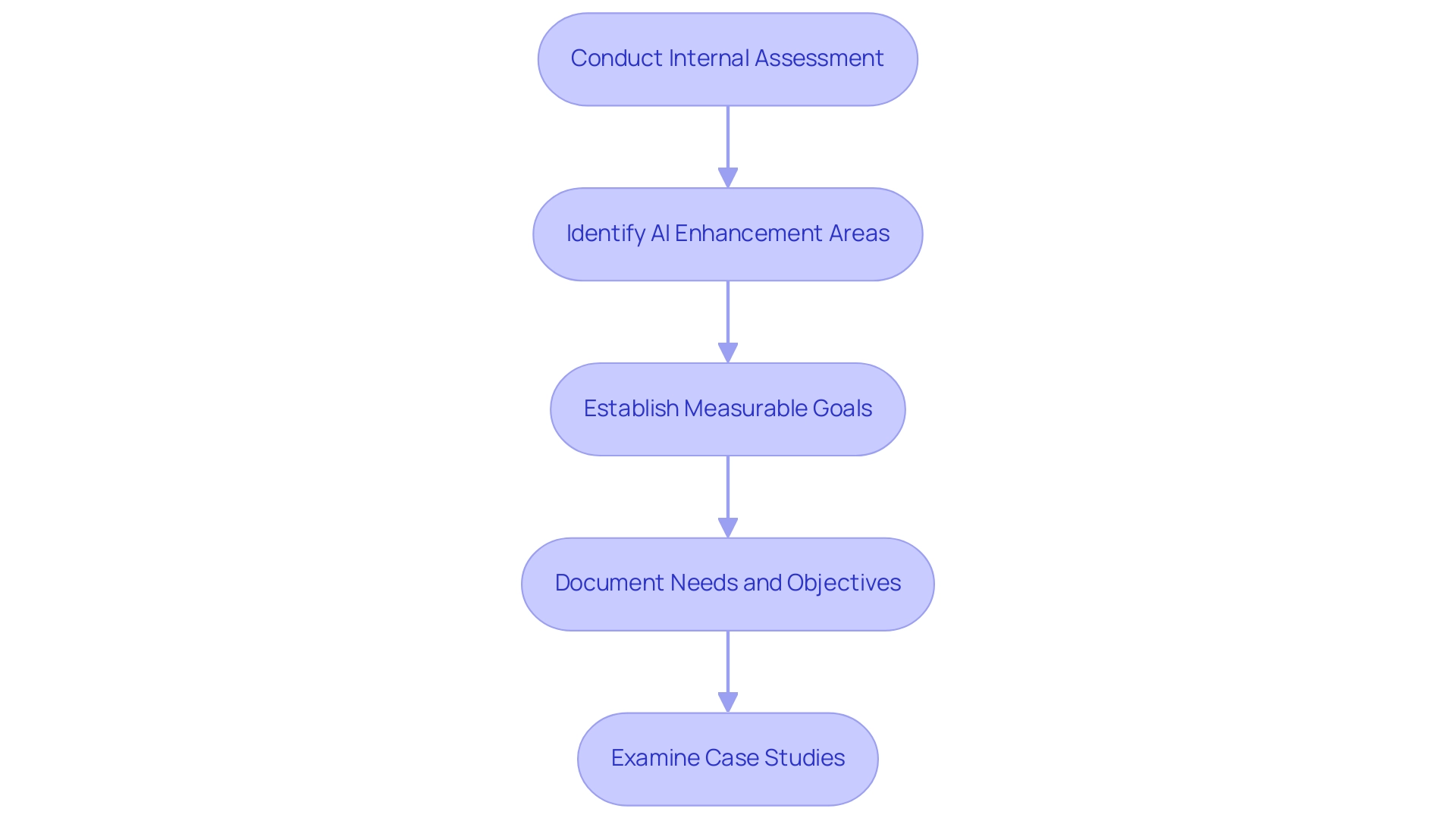
Key Criteria for Evaluating AI Consulting Agencies
When evaluating an AI consulting agency, it is crucial to adopt a structured approach based on several key criteria:
-
Expertise: Evaluate their understanding of AI technologies pertinent to your industry, as this knowledge is foundational to effective consulting.
-
Past Performance: Examine case studies or client testimonials that reflect successful outcomes, offering insights into their capabilities. For instance, one client stated, "I was really impressed with the way STS Consulting Group handled everything from the first conversation to everything in between. They were very helpful and knowledgeable."
Another client remarked, "STS Consulting Group was the missing piece to my puzzle. From start to finish, they solved every problem and helped us achieve our goals in the most professional way possible." These testimonials emphasize not only the effectiveness of their services but also imply that clients witnessed a significant reduction in timelines and improved goal attainment.
-
Alignment with Business Objectives: Ensure that the organization's methodology and goals are in sync with your strategic vision, facilitating a collaborative partnership.
-
Technical Capabilities: Assess their proficiency with AI tools and methodologies, which can significantly impact the success of your projects.
-
Cultural Fit: Consider if the firm's values and working style correspond with your establishment's culture, promoting a fruitful working relationship. As firms must be willing to change and adapt their practices to become AI organizations, cultural fit and alignment with business objectives are essential in the evaluation process. To facilitate decision-making, consider creating a scoring system to systematically compare organizations against these criteria.
Furthermore, with 85% of the general public believing a nationwide effort is necessary to make AI safe and secure, choosing a trustworthy AI consulting agency becomes even more critical. As Robert Kugel, Executive Director of Business Research at Ventana Research, notes,
Simple applications of AI are likely to produce an underappreciated boost to productivity,
emphasizing the transformative potential of effective AI partnerships.
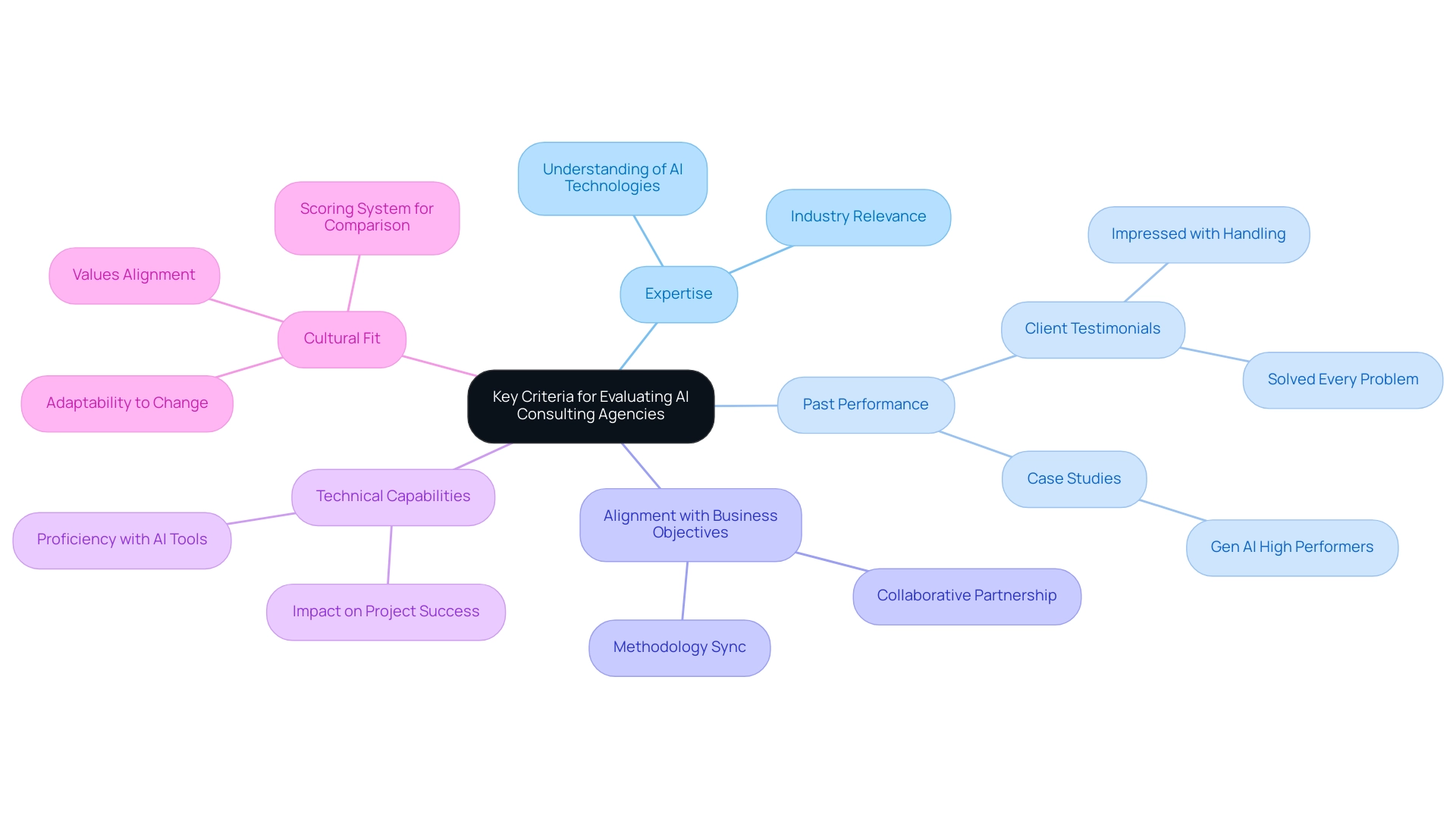
The Importance of Industry Expertise in AI Consulting
When choosing an AI consulting agency, it is crucial to select one with proven experience in your industry. This specialized expertise enables the organization to navigate the distinct challenges and opportunities that characterize your sector. For example, a professional services firm with a focus on healthcare will possess the necessary insights to effectively manage regulatory compliance and patient data privacy concerns—areas where generalist firms may lack depth.
Furthermore, it is beneficial to seek agencies that can present relevant case studies or references from similar businesses, thereby validating their industry knowledge. The significance of this expertise is underscored by the recent Executive Order issued by the White House in October 2023, which established new standards for AI safety and security in healthcare. Additionally, utilizing specialized AI advisory services can lead to efficiency gains, as employees can save an average of 1.75 hours per day on administrative tasks through GenAI solutions.
The varied public sentiment regarding AI applications in healthcare, as highlighted in the case study titled "Public Perception of AI in Surgery," emphasizes the need for tailored approaches in this sector. As the Global Natural Language Processing (NLP) market is anticipated to expand at a compound annual growth rate (CAGR) of 29.3% by 2028, incorporating specialized knowledge into your AI initiatives is not just beneficial; it is crucial for ensuring success and compliance in a changing regulatory environment.
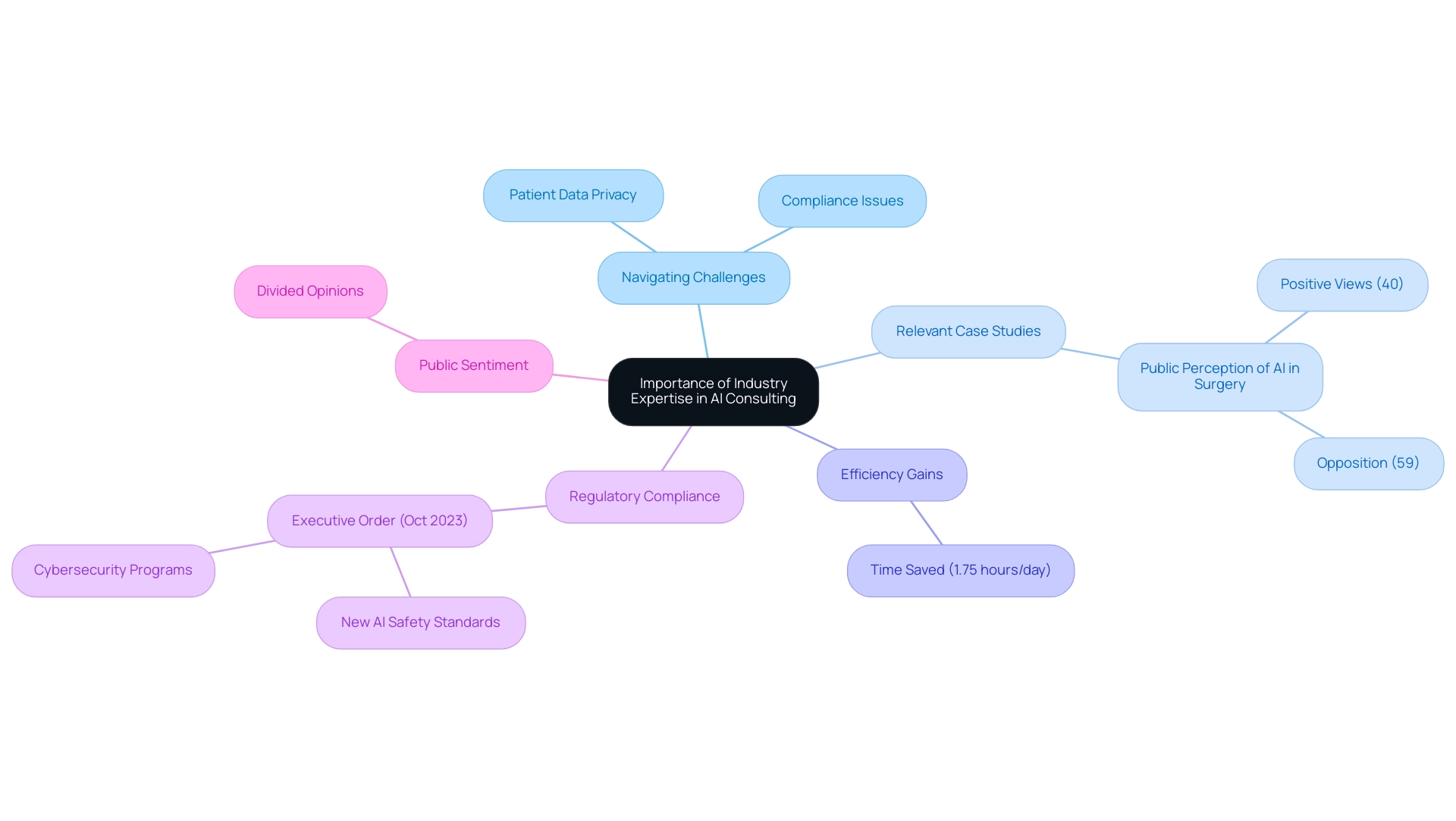
Navigating Challenges in AI Consulting Engagements
Engaging with an AI consulting agency presents several challenges that organizations must navigate to ensure successful results. One of the most pressing issues is scope creep, which can derail initiatives by extending their boundaries beyond the original intent. To combat this, it is vital to establish clear boundaries and objectives from the outset.
This clarity allows teams to stay focused and aligned with the project's goals, ultimately leading to more efficient execution. Significantly, with 58% of B2B firms having integrated chatbots on their websites, the prevalence of AI solutions highlights the importance of managing scope effectively to alleviate associated challenges in advisory engagements.
Another significant challenge is miscommunication between the internal team and the AI consulting agency. To mitigate this risk, entities should implement regular check-ins and updates, fostering open lines of communication that ensure all parties remain aligned throughout the project lifecycle. This proactive approach can prevent misunderstandings and misaligned expectations.
Additionally, resistance to change is a common hurdle during AI implementation. Preparing the entity for the cultural shifts that AI may introduce is crucial. Engaging stakeholders early in the process and providing comprehensive training can help ease transitions, encouraging acceptance and adoption of new technologies.
The case study titled 'Impacts of AI on Workforce' illustrates how AI is poised to automate tasks typically carried out by humans, resulting in significant workforce changes that businesses must be ready to address.
By recognizing and addressing these challenges head-on, organizations can collaborate with an AI consulting agency to develop robust strategies that not only facilitate smoother AI engagements but also leverage the high-quality data sources that AI-fueled operations can provide. As the AI landscape continues to evolve, with industry leaders like Apple and Google holding a combined market share of 72%, understanding these dynamics will be imperative for successful AI integration.
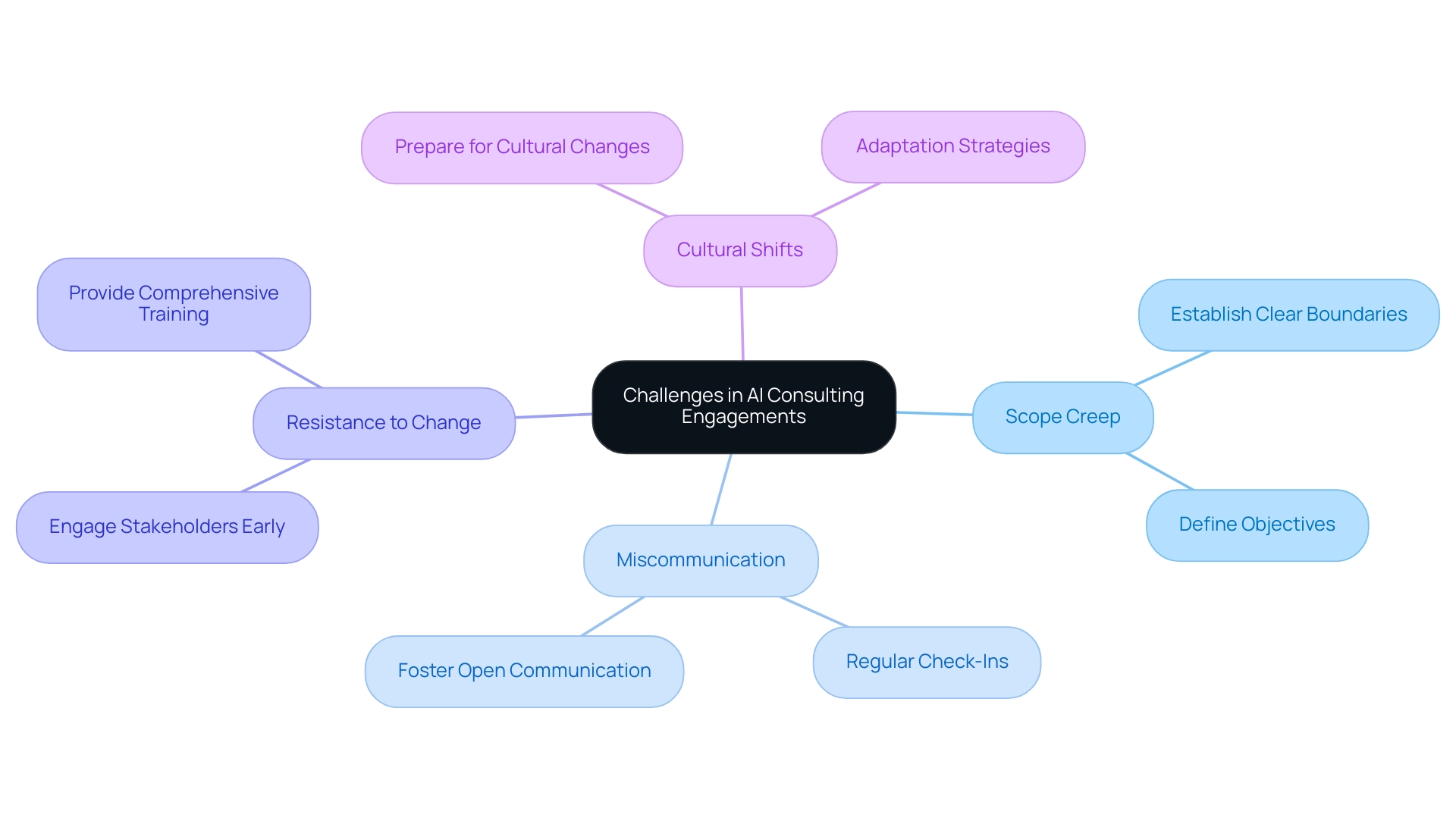
Fostering Effective Communication with Your AI Consulting Partner
Effective communication with your AI consulting agency is paramount to the success of your initiatives. Begin by establishing clear communication channels to ensure that all parties are aligned from the outset. Scheduling regular meetings is crucial for discussing progress, addressing challenges, and outlining next steps.
These meetings act as a platform to celebrate small victories, as highlighted in the case study 'Achieving Wins in AI Initiatives,' which can foster trust and momentum for future AI endeavors. Utilize collaborative tools that enable real-time document sharing and updates, thereby enhancing transparency and fostering a culture of open dialogue. This approach allows for prompt resolution of any emerging concerns.
It is also wise to appoint a liaison from your organization to act as the main point of contact with the AI consulting agency, ensuring consistency and clarity in communication throughout the initiative. As advancements in AI, including sentiment analysis and predictive text, continue to reshape communication dynamics, empowering your team to engage meaningfully with AI systems will enhance the overall effectiveness of your professional engagement. With advancements like sentiment analysis and predictive text, communicating with AI has become a more intuitive experience, empowering users to ask complex questions and receive personalized answers effectively.
Furthermore, keep in mind Risi's four steps of an AI project:
- Scoping
- Defining data
- Modeling
- Deployment
as they provide a structured framework for your consulting process.
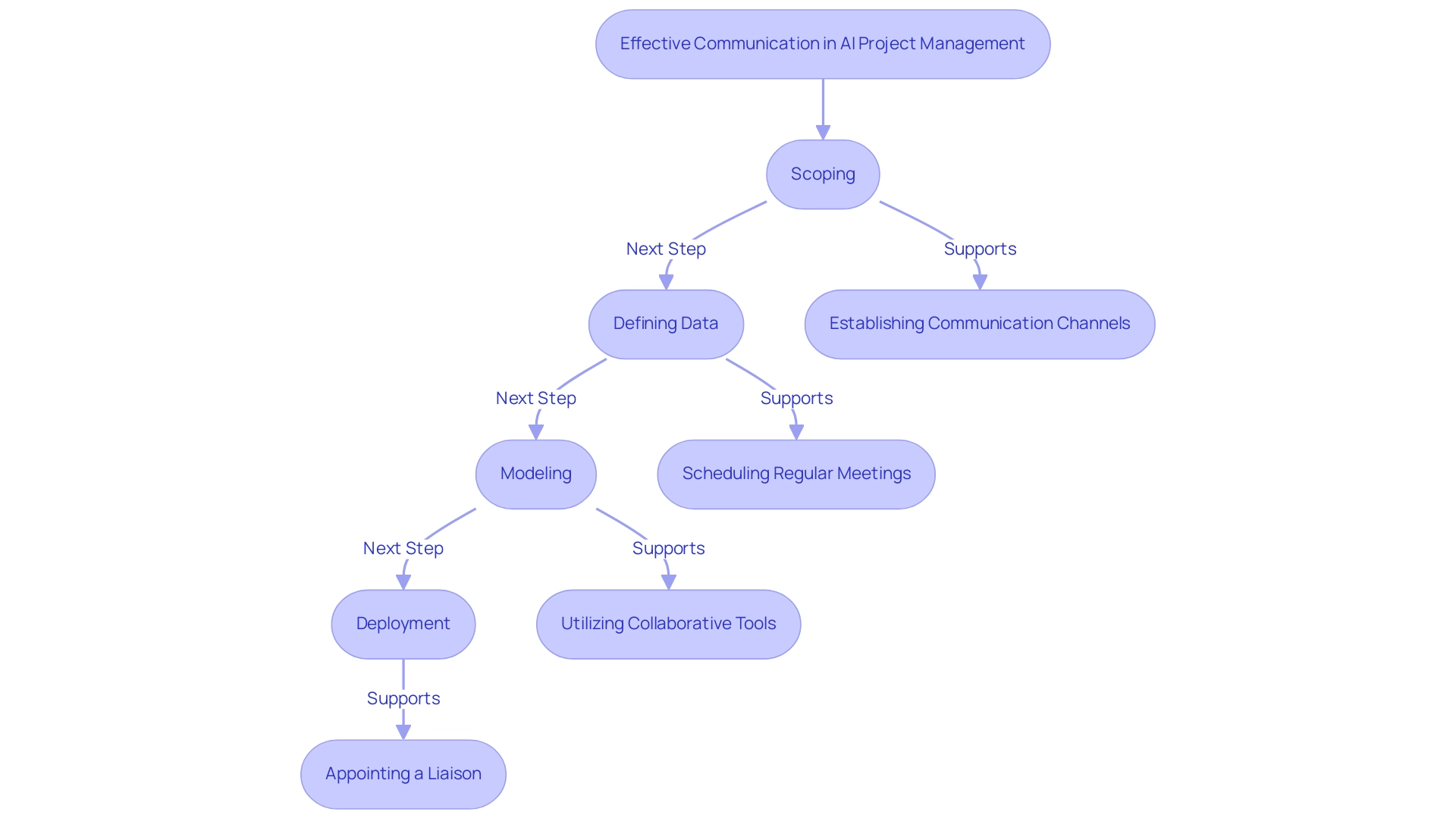
Conclusion
Organizations venturing into AI consulting must prioritize a strategic approach to maximize the benefits of these powerful technologies. By first identifying specific business needs and establishing clear goals, companies can pave the way for meaningful AI integration that aligns with their operational objectives. The evaluation of potential consulting partners should be meticulous, focusing on industry expertise, past performance, and cultural fit to ensure a collaborative relationship that fosters innovation.
Navigating the complexities inherent in AI engagements requires a proactive stance on communication and project management. Establishing clear boundaries and maintaining open lines of dialogue will mitigate common challenges such as scope creep and miscommunication. Additionally, preparing the organization for the cultural shifts that AI introduces is essential for promoting acceptance and facilitating smooth transitions.
Ultimately, the journey toward successful AI implementation is one of careful planning and strategic partnership. By adopting these essential steps, organizations can confidently engage with AI consulting services, harnessing the full potential of artificial intelligence to drive growth and innovation. As the AI landscape continues to evolve, those who embrace these best practices will not only enhance their operational capabilities but also position themselves as leaders in their respective industries.




